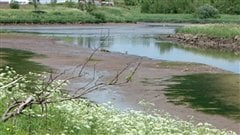The show this week is presented by Wojtek and Marc as Lynn is off today for a holiday.
ListenBefore she took the day off, Lynn left us a story to present.

February is Black History Month in Canada, and Lynn looked into a dark past in this country.
Its an old and rare image of an African woman which is displayed in a Montreal museum. Many Canadians are taught about the Underground Railway – a secret network of safe houses, routes, and sympathetic people, which helped to smuggle black slaves out of the US and into Canada where slavery was abolished.
However, not much is taught about the 200 years prior to that when slavery also existed in Canada.
Lynn spoke to Professor Charmaine Nelson of McGill University about the “Portrait of a Negro Slave”.
and I have a look at the importance of wetlands around the world, These are generally areas of shallow water or very wet grounds often referred to as ponds, marshes, or swamps for example..but can also be areas around the edges of lakes or slow moving areas of rivers streams or creeks.
These are either home of provide a haven for a very wide variety of life, including fishes, birds, animals, and plants. They provide vital services to the environment. For example they act as sponges to mitigate floods and droughts by absorbing water when its in excess, and releases it during dry spells.

Wojtek looked into the ongoing issue of federal budget cuts which have cut deeply into a variety of research areas, eliminating some long term projects, some research facilities, and the closing of a number of specialized research libraries.
A union of scientists conducted some surveys of Canadians to find out what their “scientific” concerns were.
The summary report is called, “Vanishing Science: The Disappearance of Public Interest Science”
Wojtek Gwiazda spoke to Peter Bleyer, PIPSC’s Communications and Policy Section Head about the report, the commitment and concern of federal scientists, and why this report was written.
and I had a story on the importance of Wetlands.

These are usually shallow ponds, or marshes, or other areas of slow moving areas of water around the edges of lakes or streams.
Much of the world’s wetlands have been lost through such things as industrial, agricultural, or residential housing expansion. But we are coming to understand the importance of these areas, often thought of as wasted land in the past.
Still threatened by human expansion and by pollution, they are now being understood by scientists as being home and haven to vast numbers of species, fish, birds, animals, and plants, but also as being an important segment of the environment with big economic benefits such as their role in mitigating the effects of floods and droughts.
I speak to a Philippe Van Capellen, a professor at the University of Waterloo, in Ontario and the Canada Excellence Research Chair in Ecohydrology.







For reasons beyond our control, and for an undetermined period of time, our comment section is now closed. However, our social networks remain open to your contributions.